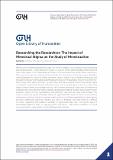Files in this item
Researching the researchers : the impact of menstrual stigma on the study of menstruation
Item metadata
| dc.contributor.author | Owen, Lara | |
| dc.date.accessioned | 2023-05-10T11:30:05Z | |
| dc.date.available | 2023-05-10T11:30:05Z | |
| dc.date.issued | 2022-02-11 | |
| dc.identifier | 285694001 | |
| dc.identifier | 54789ea2-f94d-42c0-94c2-dfba2fed0d67 | |
| dc.identifier | 85125488412 | |
| dc.identifier.citation | Owen , L 2022 , ' Researching the researchers : the impact of menstrual stigma on the study of menstruation ' , Open Library of Humanities , vol. 8 , no. 1 . https://doi.org/10.16995/olh.6338 | en |
| dc.identifier.issn | 2056-6700 | |
| dc.identifier.other | ORCID: /0000-0003-2955-8094/work/135018732 | |
| dc.identifier.uri | https://hdl.handle.net/10023/27559 | |
| dc.description | Funding: Royal Society of Edinburgh. | en |
| dc.description.abstract | Menstruation has been stigmatised through a variety of strategies cross-culturally, including silencing and marginalisation. The purpose of this paper is to gain a deeper understanding of the perceived nature and impact of such stigmatisation on the professional experience of menstrual researchers. The research cohort was a group of nine scholars from humanities and social science disciplines working together on a research project on menstruation in politics. I was a member of the group and this paper is structured through an autoethnographic enquiry. My qualitative research was interview-based using online video meetings. The data shows that the perceived impact of menstrual stigma on academic research has altered, with older researchers experiencing more barriers in the early stages of their careers than younger ones do now. However, menstrual researchers still experience challenges they consider to be stigma-related in publishing menstrual research, obtaining permanent positions centred on their specialisation, and attracting long-term and large-scale funding. This research details the impact of multiple effects of stigma upon the careers of menstrual researchers and demonstrates the relationship between stigma and capitals. When exacerbated by contemporary precarity, undertaking menstrual research can lead to a feedback loop from which it is difficult to escape, suggesting that academics working on stigmatised topics may need specific types of institutional support in order to progress, publish and flourish. This article contributes to critical menstrual studies, stigma studies, and autoethnographic methods. | |
| dc.format.extent | 25 | |
| dc.format.extent | 414334 | |
| dc.language.iso | eng | |
| dc.relation.ispartof | Open Library of Humanities | en |
| dc.subject | Autoethnography | en |
| dc.subject | Menstruation | en |
| dc.subject | Menstrual | en |
| dc.subject | Stigma | en |
| dc.subject | Researcher | en |
| dc.subject | H Social Sciences | en |
| dc.subject | Social Sciences(all) | en |
| dc.subject | NDAS | en |
| dc.subject | NIS | en |
| dc.subject | MCC | en |
| dc.subject.lcc | H | en |
| dc.title | Researching the researchers : the impact of menstrual stigma on the study of menstruation | en |
| dc.type | Journal article | en |
| dc.contributor.institution | University of St Andrews. School of Modern Languages | en |
| dc.identifier.doi | 10.16995/olh.6338 | |
| dc.description.status | Peer reviewed | en |
This item appears in the following Collection(s)
Items in the St Andrews Research Repository are protected by copyright, with all rights reserved, unless otherwise indicated.

